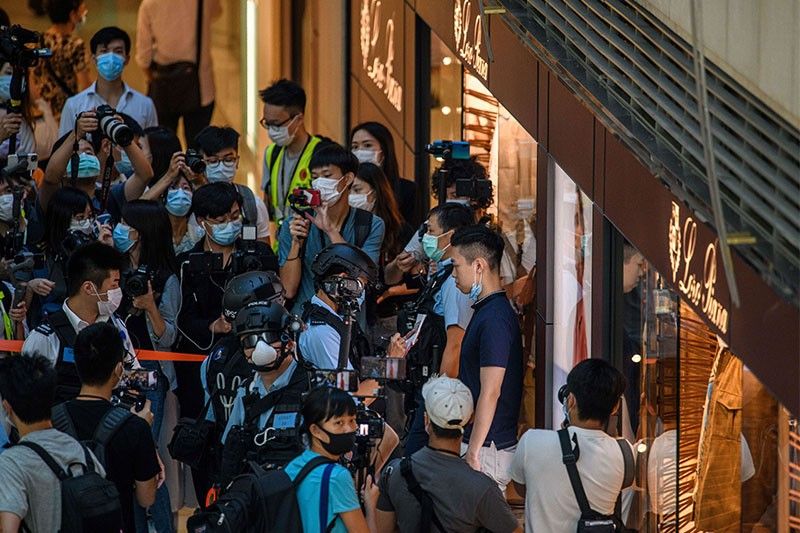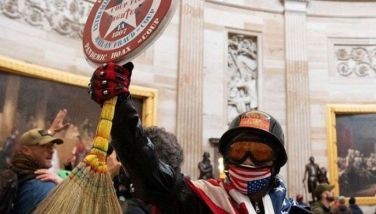China imposes feared Hong Kong security law

BEIJING, China — China imposed a sweeping national security law on Hong Kong Tuesday, dramatically tightening its grip on the semi-autonomous city in a historic move decried by Western nations as a threat to the financial hub's freedoms.
Described by Beijing as a "sword" hanging over the heads of those endangering national security, the law took effect hours after it was signed by President Xi Jinping and just six weeks since it was first unveiled.
Fed up with pro-democracy protests that rocked the city last year, China's top lawmaking body enacted the legislation following closed-door deliberations that kept details secret until its passage.
The law gives Beijing jurisdiction over "very serious" national security crimes, with offenders facing up to life in prison, according to the text published late Tuesday.
The controversial law also empowers China to set up a national security agency in the city, staffed by officials who are not bound by local law when carrying out duties.
The new suite of powers radically restructures the relationship between Beijing and Hong Kong, toppling the legal firewall that has existed between the city's independent judiciary and the mainland's party-controlled courts.
"It marks the end of Hong Kong that the world knew before," prominent democracy campaigner Joshua Wong tweeted as his political party Demosisto announced it was disbanding.
"With sweeping powers and ill-defined law, the city will turn into a #secretpolicestate."
Some Hong Kongers responded by deleting Twitter accounts and scrubbing other social media platforms.
In contrast, former city leader Leung Chun-ying took to Facebook to offer bounties of up to HK$1 million ($130,000) for anyone who could help secure the first prosecutions under the new legislation or track down people who have recently fled the city.
Twenty-seven countries, including Britain, France, Germany and Japan, urged Beijing to "reconsider the imposition" of the legislation, saying in a statement to the UN Human Rights Council that it "undermines" the city's freedoms.
The move has also added fuel to tensions between Beijing and Washington, where condemnation of the move crossed the aisle.
Top Democrat Nancy Pelosi said its "brutal purpose" was to "frighten, intimidate & suppress the speech of Hong Kongers," and Republican Mitt Romney tweeted that his "heart aches for the people of Hong Kong. Any semblance of freedom and autonomy has vanished."
'Fundamental change'
As part of the 1997 handover from Britain, Hong Kong was guaranteed certain freedoms — as well as judicial and legislative autonomy — for 50 years in a deal known as "One Country, Two Systems."
The formula helped to cement the city's status as a world-class business hub, bolstered by a reliable judiciary and political freedoms unseen on the mainland.
Critics have long accused Beijing of chipping away at that status, but they describe the new security law as the most brazen move yet.
British Prime Minister Boris Johnson said he was "deeply concerned" and that London would scrutinise the law "to understand whether it is in conflict" with the handover agreement.
The law bans four types of national security crimes: subversion, secession, terrorism and colluding with foreign forces to endanger national security.
The text gave three scenarios in which China might take over a prosecution — complicated foreign interference cases, "very serious" cases and when national security faces "serious and realistic threats."
Cases can be passed to mainland China, with the Supreme People's Procuratorate and the Supreme Court designating the judicial authorities handling them.
Lead perpetrators and serious offenders can receive 10 years to life in prison for engaging in one of the national security crimes.
The law also said certain national security cases could be held behind closed doors without juries in Hong Kong if they contained state secrets, although the verdict and eventual judgments would be made public.
"It's a fundamental change that dramatically undermines both the local and international community's confidence towards Hong Kong's 'One Country, Two Systems' model and its status as a robust financial centre," Hong Kong political analyst Dixon Sing told AFP.
Restore stability
On the mainland, national security laws are routinely used to jail critics, especially for the vague offence of "subversion."
Beijing and Hong Kong's government reject those allegations.
They have said the law will only target a minority of people, will not harm political freedoms in the city and will restore business confidence after a year of historic pro-democracy protests.
"I urge the international community to respect our country's right to safeguard national security and Hong Kong people's aspirations for stability and harmony," Hong Kong city leader Carrie Lam told the UN Human Rights Council in a video message on Tuesday.
Millions took to the streets last year, while a hard core of protesters frequently battled police in often violent confrontations that saw more than 9,000 arrested.
Hong Kong has banned protests in recent months, citing previous unrest and the coronavirus pandemic, although local transmissions have ended.
Some Western nations warned of potential repercussions ahead of the security law's passing.
However, many are also wary of incurring Beijing's wrath and losing lucrative access to the mainland's huge economy.
"We deplore this decision," said European Council head Charles Michel.
Washington — which has embarked on a trade war with China -—has said the security law means Hong Kong no longer enjoys sufficient autonomy from the mainland to justify special status.
The United States on Monday ended sensitive defence exports to Hong Kong over the law, prompting China to threaten unspecified "countermeasures."
Millions march in Hong Kong in a powerful rebuke of an extradition law feared to expose them to China's capricious justice system.
Hong Kong national security police on Thursday detained four people, including the brother of prominent activist Dennis Kwok, one of eight fugitives with bounties on their heads for allegedly breaching national security.
The city's national security department "took in two men and two women from various districts in Hong Kong and Kowloon for investigation," a police source told AFP.
Among the four was the elder brother of former democracy lawmaker Dennis Kwok, who is currently in the United States.
"(Kwok's elder brother) is now under investigation in the Western District police station," the source said.
Three others, "two women and a man", were taken in Tuesday by the national security department, authorities told AFP earlier Thursday.
AFP has requested comment from police on the most recent detentions. — AFP
Three family members of exiled democracy activist Nathan Law have been taken in for questioning on Tuesday, days after authorities issued a bounty on him and seven others accused of breaching the city's national security law.
Police officers from the national security department brought in Law's parents and elder brother without formally arresting them, a police source confirmed to AFP.
"It's understood that officers from the NSD took three people -- Nathan Law's parents and elder brother -- in for questioning," they said.
"So far, no arrest has been made." — AFP
The United States condemns Hong Kong authorities for issuing bounties linked to democracy activists based abroad, saying the move sets a dangerous precedent that could threaten human rights.
Hong Kong police offered bounties of HK$1 million (about $127,600) for information leading to the capture of eight prominent dissidents who live abroad and are wanted for national security crimes.
"The United States condemns the Hong Kong Police Force's issuance of an international bounty" against the eight activists, State Department spokesperson Matthew Miller says in a statement.
"The extraterritorial application of the Beijing-imposed National Security Law is a dangerous precedent that threatens the human rights and fundamental freedoms of people all over the world," he adds, saying China is engaging in "transnational repression efforts."
"We call on the Hong Kong government to immediately withdraw this bounty, respect other countries' sovereignty, and stop the international assertion of the National Security Law imposed by Beijing." — AFP
Hong Kong's top court has quashed the conviction of a journalist in relation to her investigation into an attack on democracy supporters by government loyalists in 2019.
It was a rare victory for the press industry in a city where two major independent news outlets have been forced to shut down since Beijing imposed a national security law in 2020.
"Happy -- I could not think of another word that can describe my mood right now," veteran journalist Bao Choy said outside the Court of Final Appeal after the judgement was handed down.
"I think this kind of happiness belongs to everyone in society." — AFP
Hong Kong police detained Alexandra Wong, a prominent democracy activist better known as "Grandma Wong" on Sunday, the 34th anniversary of the Tiananmen Square crackdown, AFP reporters said.
Wong was carrying flowers in Hong Kong's Causeway Bay shopping district, an area that for years was the site of June 4, 1989, commemorations, before authorities escorted her to a police van. AFP reporters saw a total of six people bundled into police vehicles. — AFP
- Latest
- Trending


































